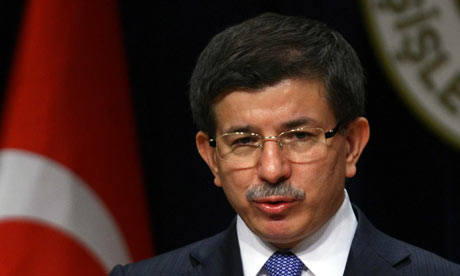after US vote on Armenian genocide
Strategic partnership at risk despite Barack Obama’s attempts to stop Congress resolution
- Robert Tait in Istanbul and Ewen MacAskill in Washington
- guardian.co.uk, Friday 5 March 2010 21.34 GMT
 Foreign minister Ahmet Davutoglu says describing the 1915 Armenian killings as genocide is an insult to Turkey’s ‘honour’. Photograph: Adem Altan/AFP/Getty Images
Foreign minister Ahmet Davutoglu says describing the 1915 Armenian killings as genocide is an insult to Turkey’s ‘honour’. Photograph: Adem Altan/AFP/Getty Images
Turkey has threatened to downgrade its strategic relationship with the US amid nationalist anger over a vote in the US Congress that defined the mass killings of Armenians during the first world war as genocide.
Barack Obama‘s administration, which regards Turkey as an important ally, was today desperately seeking to defuse the row. It expressed its frustration with the House of Representatives’ foreign affairs committee, which voted 23-22 yesterday in favour of a resolution labelling the 1915 massacre of up to 1.5 million Armenians a “genocide”.
A furious Turkey may now deny the US access to the Incirlik air base, a staging post for Iraq, as it did at the time of the 2003 invasion, or withdraw its sizeable troop contribution to the coalition forces in Afghanistan.
On the diplomatic front, the US needs the support of Turkey, which has a seat on the UN security council, in the push for sanctions against Iran over its nuclear programme. Turkey is also helpful to the US on a host of other diplomatic issues in the Middle East and central Asia.
The White House and state department began work today to try to prevent the controversial issue making its way to the floor of the house for a full vote.
In Turkey, Suat Kiniklioglu, the influential deputy chairman for external affairs in the ruling Justice and Development party (AKP), warned of “major consequences” if the resolution was accepted by the full House of Representatives.
“If they choose to bring this to the floor they will have to face the fact that the consequences would be serious – the relationship would be downgraded at every level,” he said. “Everything from Afghanistan to Pakistan to Iraq to the Middle East process would be affected.
“There would be major disruption to the relationship between Turkey and the US.”
His comments reflected deep-seated anger throughout Turkish society, as well as an official determination to press the Obama administration into making sure the resolution progresses no further.
Turkey withdrew its ambassador to Washington for urgent “consultations” immediately after the vote, which was screened live on nationwide television.
Its foreign minister, Ahmet Davutoglu, appeared to blame the outcome on the White House, and said that describing the 1915 Armenian killings as genocide was an insult to Turkey’s “honour”. France and Canada have both classified the killings as genocide, unlike Britain.
“The picture shows that the US administration did not put enough weight behind the issue,” Davutoglu told a news conference. “We are seriously disturbed by the result.”
The mass killing of up to 1.5 million Armenians has long been a highly sensitive subject in Turkey. While the issue is now more openly debated than in the past, Turkish officials insist that to describe it as genocide equates it with the Nazi Holocaust.
Turkey admits that hundreds of thousands of Armenians died, but disputes suggestions that it was part of a programme to eliminate the population, insisting instead that many died of disease. It has also suggested that the numbers have been inflated, and pointed out that many Turks died at the hands of Armenians.
Hillary Clinton, the US secretary of state, who is on a visit to South America, stressed that both she and Obama opposed the house vote and wanted to see it go no further. She said any action by Congress was not appropriate. “We do not believe that the full Congress will, or should, act upon that resolution, and we have made that clear to all the parties involved.”
Asked how she squared her support for the Armenian campaign on the election campaign trail with her new position, she said circumstances had changed, with the Turkish and Armenian governments engaged in talks on normalisation and a historical commission established to look at past events.
“I do not think it is for any other country to determine how two countries resolve matters between them, to the extent that actions that the United States might take could disrupt this process,” she said.
The chairman of the Armenian National Committee of America, Ken Hachikian, who led the lobbying campaign to get the house committee to back the resolution, today dismissed the Turkish threat of reprisals. “This is part of a Turkish pattern or huffing and puffing. With the other 20 countries that have passed similar resolutions, they made similar threats and then it was business as usual,” he said.
Hachikian, who is based in Washington, said he hoped the vote would go to the full house before 24 April, Armenian genocide commemoration day. He accused Obama and Clinton of hypocrisy in trying to block a vote, saying they had supported the Armenian campaign during the presidential election.
He said the Turkish government had spent $1m during the past few months lobbying members of Congress. His committee had spent only $75,000, which included adverts in media outlets read by members of Congress and their staff.
Although Hachikian claimed to have the votes needed, and 215 members of the 435-member house have publicly backed the resolution, the chances of a full vote are small, given the opposition from the White House and state department.
The vote came as attempts at rapprochement between Turkey and Armenia – which have no diplomatic ties – had already run aground. A protocol signed in Geneva last October promising to restore relations has yet to be ratified by the parliament of either country.
Both Turkish and Armenian analysts voiced fears that the protocols may now be doomed.
